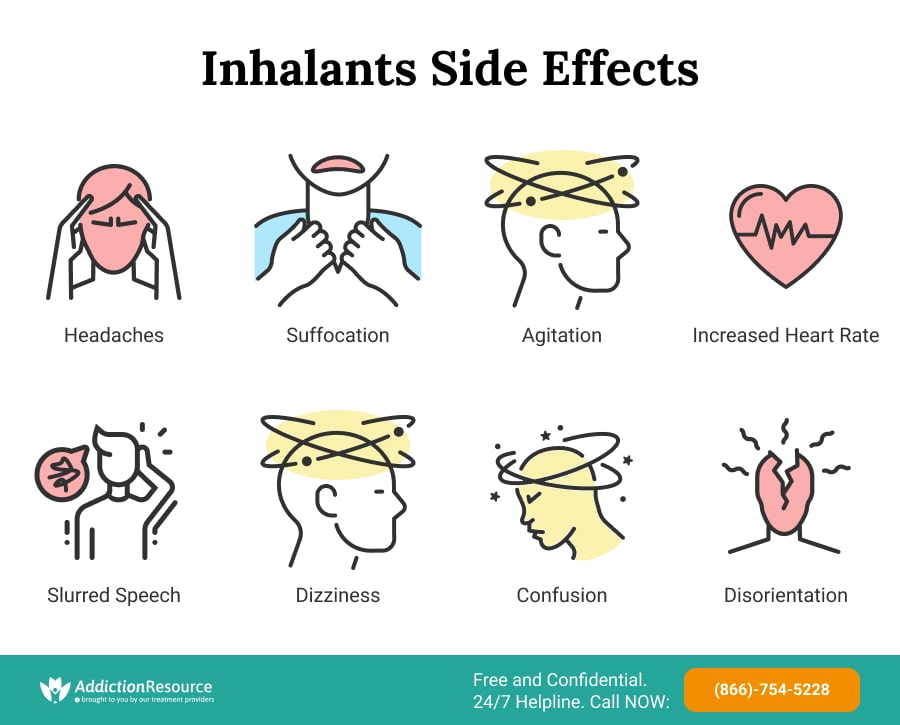Inhalants are the substances that users inhale to get a certain kind of euphoric mind-altering experience. Many of these inhalant substances are legal everyday products including glue, spray paints, felt tip markers, and types of gasoline which are completely harmless for everyday purposes. Easy availability of these substances makes them commonly abused drugs with no supervision.
Table Of Contents:
However, when the vapors are inhaled for recreational purposes to get that feeling of euphoria, these can become toxic and even fatal in some cases. Vapors are quickly absorbed through the nasal mucosa when inhaled or from the lungs into the bloodstream. This creates a short-lived intoxication that wears off in no time. This leads to repeated use of drugs and thus predisposes to risks and harmful effects of inhalant abuse.
In this article, information on the side effects of inhalants on one’s health, the risk of a drug overdose, and the dangers of inhalants is discussed along with the treatment options.
Short-Term Effects Of Inhalants Use
Everyday availability and use of commonly abused inhaled substances give rise to common misconceptions of their safety on national and international level. Many people think that they are safe and there aren’t any side effects of inhalants because they can be easily found around the house. It can‘t be further from the truth. They are bad news because they directly affect the brain producing short-termed inhalant effects similar to alcohol intoxication and causing CNS and other body function depression. There are many other short term effects of inhalants that can adversely affect one’s health and quality of life. Here is the list of short-term physical effects along with psychological disturbances pertaining to their use.

Short-term Physical Effects Of Inhalants Use
Physical effects of inhalant use are often short-termed and resolve quickly as the inhalant effects of the substance wear off. This makes it difficult to recognize abuse in teenagers due to their vague symptoms and short-lived action.
Still, Some of the Short Term Effects of Inhalants That Are Easily Recognized and May Affect One’s Health Are as Follows:
- Headache
- Suffocation
- Nausea
- Drowsiness
- Dizziness
- Slurred speech
- Lethargy
- Depressed reflexes
- Muscle weakness
- Anesthesia
- Agitation
- Incoordination
- Dazed appearances
- Increased heart rate
- Arrhythmias
These side effects of inhalants are profound even in the short-term use of inhaled substances. The use of nitric oxide can lead to vasodilation. When the effect of vasodilation wears off it can cause a severe throbbing headache. All the other short-term effects of inhalants can be attributed to the CNS depression effect of the aerosols, such as, for instance, keyboard air cleaner misuse.
Short Term Psychological Effects of Inhalants
The short term effects of inhalants on the central nervous system and rapid intoxication can also cause psychological side effects of inhalants. Psychological effects are mainly due to addiction to the substance and repeat exposure which can cause dependence on the substance.
The Psychological Effects Are:
- Deliriums
- Confusions
- Delayed decisions
- Inability to focus
- Belligerence
- Apathy
- Awkward social functioning
- Detachment
- Physical and psychological dependence
- Disorientation
- Withdrawal effects
A strong urge to use the substance again is reported by many people. These short term effects of inhalants can be seen even with the one-time use of the substance. So what does sniffing glue do to you? It can lead to psychological dependence on the substance. If any side effects of inhalants occur, it is crucial to get immediate medical assistance for the treatment of addiction and inhalant effects.
Long-Term Effects Of Inhalants Use
According to studies, inhalants are the most commonly used drugs by teenagers between 12 to 14 years of age and more than 22.9 million Americans have experimented with inhalants in their life which can have lasting inhalants effect on the body. This makes them a national threat. Every other day news features the demise of some students due to their abuse.
Sniffing paint, glue, and other substances for a long time can cause serious health problems and organ damage. Although short term effect of inhalants are often temporary and relieved when the insulting substance is stopped, it is not the case with the long term effects of inhalants, long term damage to organs such as the brain, heart, kidneys, and lungs is often permanent and need medical attention to preserve any remaining organ function. For convenience, here are the long term effects of inhalants strategically divided into organ systems for better information delivery and understanding.
Central Nervous System
Toluene from glues and spray paints can cause central nervous system damage. Long term effects of inhalants can cause symptoms mimicking parkinsonism and other brain degenerative diseases such as multiple sclerosis. Inhalant effects can also cause permanent damage to neuronal cells resulting in anterograde and retrograde amnesia.
Respiratory And Cardiovascular System
One of the most profound short-term and long term effects of inhalants is an irregular heartbeat which can progress to arrhythmias which are rapid irregular heart rhythms. These adverse effects of inhalants can also cause heart failure due to excessive straining of the heart muscles. Inhaled substances can decrease the blood supply of oxygen by taking up all the space and hiding absorption through the alveoli. It can cause suffocation, asphyxia cyanosis, and syncope due to oxygen deprivation which is one side effect of inhalants.
Miscellaneous Body Systems
Hearing loss caused by the use of toluene and trichloroethylene (dry-cleaning chemicals, correction fluids) is the effect of chronic abuse of the substances. Similarly, Limb spasms are caused by the use of hexane (glues, gasoline) and nitrous oxide (whipped cream dispensers, gas cylinders) and are often permanent. Inhaled substances can also cause bone marrow damage leading to aplastic anemia and a weakened immune system.
Everyday availability and use of commonly abused inhaled substances give rise to common misconceptions of their safety on national and international level.
Inhalants Abuse In Pregnancy
Inhalant abuse in pregnancy is a leading problem in obstetrics. It can cause severe health problems in the fetus and is absolutely contraindicated. There is something called fetal solvent syndrome which is very similar to fetal alcohol syndrome. Solvents are classified as teratogenic and can even cause premature delivery or death of the fetus.
These Inhalant Effects on the Body Include:
- Congenital malformation
- Microcephaly
- Immature organs such as kidneys and lungs
- Bone deformities
- Heart defects
- Delayed neurobehavioral development
- Decrease birth weight
Although studies cannot link directly the use of specific inhaled substances and all these inhalants effect on the body of the fetus, it is highly likely that substance abuse can put the child at risk. Furthermore, these substances compromise the blood oxygen level by decreasing the absorption of oxygen in the lungs. It can lead to a decrease in the oxygen supply to the fetus and fetal hypoxia which is the leading cause of growth retardation and organ malformation in the developing child.

Can You Overdose On Inhalants?
The most dangerous effect of the inhaled substances is the sudden sniffing syndrome. It is sudden death due to overdose of inhaled substances and it can happen even with the first time use of the substance. It occurs due to toxic effects on the heart and death occurs due to sudden irregular rhythm and arrhythmias which can cause the heart to stop.
Some Other Symptoms of Inhalant Overdose Are:
- Asphyxia
- Suffocation
- Deliriums
- Convulsions in a person without a previous seizure history
- Slurred speech
- Uncoordinated gait
- Severe confusions
- Choking due to vomitus
These dangers of inhalants vary from person to person and are different for each individual. Inhalants effect on the body is affected by one’s age, previous medical condition, lung condition, and type of substance abuse. Keep in mind that different substances produce a different spectrum of overdose symptoms and the effects mentioned above are general effects that need immediate medical attention and must not be ignored. Nasal spray addiction may also become a burden for patients. So what are the effects of long term use of nasal spray?
Inhalants Mechanism Of Action And Effect On The Body
Inhalant effects produce intoxicating, anesthetic, and sometimes stimulating effects on the body which predispose to their substance abuse. Many brain systems and mechanisms are involved in producing these effects. The most common mechanism of action and also a side effect of inhalants is CNS depression. Almost all addicting vapors depress CNS to produce alcohol-like intoxication symptoms and pleasurable effects.
Furthermore, toluene is found in commonly abused vapors like glue, spray paints, dust off, and when smelling gasoline. National studies have found a direct correlation between toluene inhalant effects and dopamine production. Dopamine is responsible for the pleasurable effect and is primarily the reward hormone potentiating addiction of nearly all drugs of abuse which is also a side effect of inhalants.
Inhalation of nitrates and nitric oxide has a different mechanism of action. Vapors like whippits have nitric oxide instead of toluene. Nitrates produce vasodilation and reduce blood pressure causing anesthetic-like effects and intoxication. This sedative property can lead to its abuse.
Inhalation of toluene or nitrates can deprive the body of oxygen by taking up all the space in the lungs and creating a hindrance in oxygen absorption. One can guess why this is a bad news. This can cause severe organ damage including damage to the lungs, kidneys, heart in addition to the brain. Not only this, another side effect of inhalants is the hypotensive effects of nitrates that can cause sudden blackouts and syncope progressing to coma if not treated early and properly.
Inhalants Side Effects Treatment
Although all commonly inhaled substances are generally safe substances when used as intended still, there are various side effects of inhalants when abused. They can cause symptoms ranging anywhere from mild nausea, vomiting, and dizziness to severe organ damage, and in some cases, sudden death can ensue. Teenagers are especially liable to the addiction and dangers of inhalants.
If someone is addicted to inhaled substances. It is necessary to get help to reduce the potential dangers of inhalants. Inhalant Dependence is dangerous not only in chronic use but also in short-term use. Drug rehabilitation facilities can help users get away from Inhaled substances abuse to live a better life.
Hope Without Commitment
Find the best treatment options. Call our free and confidential helpline
Most private insurances accepted

 Authored by
Authored by  Reviewed by
Reviewed by 